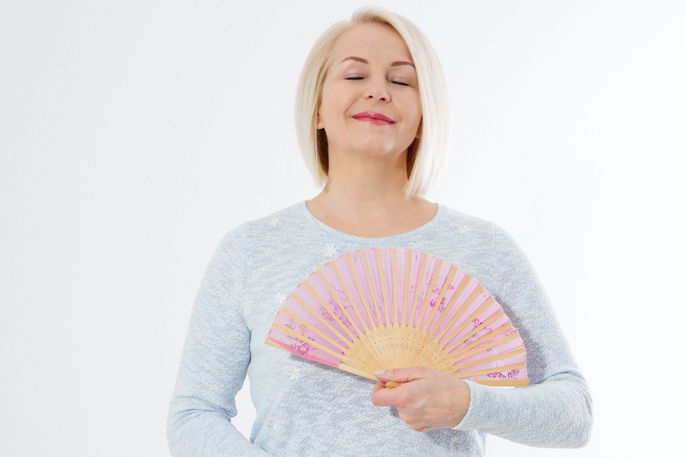For hot flash relief, your doctor may prescribe hormonal replacement therapy, and antidepressants, as well as recommend lifestyle changes. Diets that are soy-based, and natural supplements and teas can be taken to help to manage specific menopause symptoms.
Hot flashes are one of the most common symptoms of menopause. They occur due to reduced estrogen production in the ovaries and can start to emerge a few months before menopause takes place. Hot flashes typically come on suddenly at various moments of the day, and can vary in intensity from woman to woman. Very intense hot flashes can significantly interfere with a woman's quality of life.
To obtain hot flash relief, women should discuss their symptoms with their gynecologist to determine which option is best. Some therapies, like hormonal replacement therapy, may be contraindicated for some populations, and the doctor may recommend more natural interventions.

The main ways women can relieve hot flashes include:
1. Hormonal replacement therapy
Hormonal replacement therapy with estrogen pills or adhesive tapes are the most efficient way to treat hot flashes related to menopause. These help to replace estrogen levels, which tend to be low during menopause.
HRT can also help to relieve other symptoms, like excessive fatigue, vaginal dryness and hair loss.
HRT should be monitored by your gynecologist. It may be contraindicated for women with a personal or family history of breast cancer, uterine cancer, thrombosis, circulation problems, heart attack, stroke or liver disease.
2. Antidepressant medication
Antidepressants, like fluoxetine, paroxetine, or venlafaxine, may be prescribed in low doses to help relieve hot flashes. It is especially indicated for women who are unable to take HRT.
Antidepressants in these cases are only used when hot flashes interfere with quality of life. This is because these medications are associated with negative side effects.
3. Anticonvulsant medication
Anticonvulsants, like gabapentin or pregabalin, are medications that are often prescribed for the management of seizures, epilepsy or migraines. However, women with hot flashes may also benefit from them.
These medications are typically indicated for women who are unable to take HRT.
4. Anti-hypertensive medication
Antihypertensives, like clonidine, are usually prescribed by high blood pressure or migraines, however they can also be indicated for hot flash relief.
Reduced estrogen levels from menopause can interfere with normal circulation and cause vasomotor symptoms, such as hot flashes and night sweats.
Women who experience more intense night sweats may also be prescribed sleep agents, like zolpidem and zoplicone.
5. Phytoestrogens
Phytoestrogens, like soy isoflavones, can be indicated to achieve a natural hormonal replacement. They act very similarly to the estrogen that is produced by the body, and can help reduce the frequency of hot flashes, night sweats and insomnia.
Soy isoflavones are not recommended for women with a history of breast or uterine cancer, or who take thyroid medications or tamoxifen.
6. Natural medications
Some natural medications for menopause, like supplements made from medicinal plants, can help to relieve hot flashes and improve overall wellbeing.
Some examples of natural medications for menopause include:
- Black cohosh or St. John's wort: Some studies show that it can relieve hot flashes due to their antidepressant-like action. It should be prescribed by a health care professional, however, as high doses can cause liver damage.
- Pychogenol: This substance is extracted from European pine trees. It can relieve various symptoms of menopause, including hot flashes.
- Dong quai: This supplement can be beneficial for both menopause and PMS.
- Red clover: It is rich in phytoestrogens that help to manage the intensity and frequency of hot flashes.
Although they may have a positive effect, natural medications should not replace the treatment prescribed by your doctor.
In additional, natural supplements can have several effects on the body, which why they should be prescribed and monitored by a naturopath or medicinal plant specialist. Learn more about other natural remedies for menopause that you can use to manage symptoms.
6. Lifestyle changes
Life style changes can help to relieve discomfort from hot flashes. Your doctor may recommend measures such as:
- Using light, cotton-based clothing, to prevent spikes in body temperature
- Drinking about 2 L of water per day to keep the body hydrated
- Avoiding closed, hot environments, or opting for air conditioned environments
- Participating in relaxing activities, like yoga or meditation, as they can reduce anxiety and decrease the likelihood of hot flashes
- Drinking cold beverages, like coconut water and cold lemonade, when you feel a hot flash emerging
- Avoiding smoking and alcohol, as these can trigger hot flashes.
It may also be useful to keep a fan or portable fan close by.
7. Menopause diet
Diet is a very important factor that can help to manage hot flashes from menopause. Menopausal women should opt for citrus fruits (like oranges, pineapple and tangerines), as well as flaxseeds and soy products, like tofu.
Soy proteins should be avoided by women who take tamoxifen for breast cancer, as these proteins can reduce the effect of this medication.
It is also important to have heavy meals, and to reduce the intake of sugary, salty or saucy foods. Learn more about which foods to eat and avoid with a menopause diet.






























